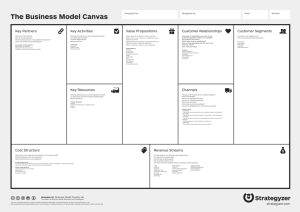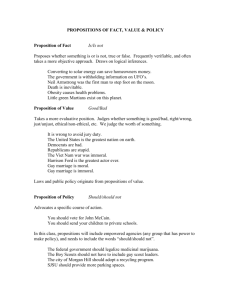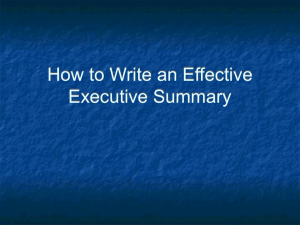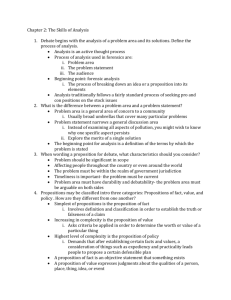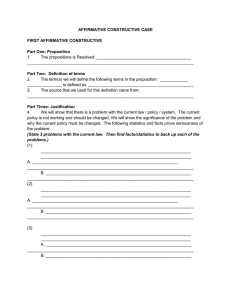File - Academic Scholar - Section D Fall 2015
advertisement
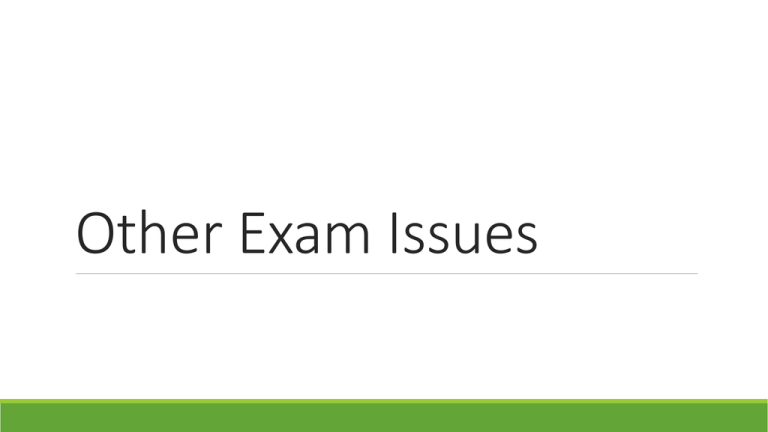
Other Exam Issues Fill in the gaps now, not later. Late October and early November is the time to fill in the gaps in your outline. If you have questions about a particular topic, schedule a meeting with your professor. Try to gather all your questions together at once, so you are respectful of your professor’s time. The goal is to have all of your law correct before you start memorizing it. It is difficult to change the way that you learned the law right before the exam. Unfortunately, this will happen on occasion, but try to strengthen your foundation as much as possible. Short Answer Most often this is where professors will test the “Black Letter Law.” Accordingly, memorization is key. You may be asked to list the elements of a rule, explain a procedure, or to define a term, concept, or doctrine in a smaller amount space. Short answer questions might also test policy or some minute detail. Flash Cards and a reduced outline or checklist help when preparing for exams that include short answer questions. How much do I write? Give the short answer questions the amount of time the professor suggests. Don’t go over on time. They are short answers; answer them in a short amount of time. What do I write? If you are asked to define a legal concept, define it. Maybe also state an example and, if you have the time or space, list some of its distinguishing factors. Remember you are being compared to others, and you are graded on what you write down, not on what you did not write. The more synthesized, exact, and organized your memorized version of the definition is, the higher the points. Another frequent exam style is a progressive short answer, which is similar to a long fact pattern but developed question by question. In this format, the professor gives a short hypothetical at the beginning, and then the professor adds facts to the original hypothetical question by question, which build on, modify, or change the original hypothetical—essentially asking “now what?” In these types of questions, be sure to read carefully and note whether each individual question asks you to consider the facts that came before or whether you are to disregard the previous facts. True/False Question True/False questions are generally statements of law or propositions. Some attempt to trick you by being deceptively straightforward, while others seem too good to be true. You must determine if any of the statement is false or if all of the statement is true. This is often where legal reasoning and logic is tested. Though many students feel they should be tested on the law and not logic, the practice of law inherently involves logic. Some tips for answering True/False questions include: First, make the proposition or statement make sense to you. If you do not understand the proposition, you will not arrive at the correct answer. One way is to rewrite the proposition in a way that makes sense to you. Rearranging the statement may reveal its truth or falsity. Use logic, such as IF/THEN reasoning. If the option is true – what rule of law does it promote? Study the reasoning, and check the result. If the reasoning is not correct, then the response cannot be correct. Always check your answers! Do not ignore facts in the proposition. If the proposition states, “Alice was gone from the store for 15 days, but Alice was reasonable in supervising her employees.” You can assume she was reasonable; therefore, she could not be negligent as negligence requires unreasonable conduct. Take the facts as they are. Don’t ignore the actual law. Remember these are only propositions. You are to determine whether or not they correctly state the law. ◦ For example: The prosecutor proves that Austin shot Alice, and Alice died an hour later. Austin is guilty of murder. True or False? ◦ Answer: False. The prosecutor must also prove the shot caused Austin to die. The professor may also test by giving an incomplete definition or incomplete argument justifying the legal conclusion. ◦ For example: Murder is the unjustified killing of a human being. True or False? ◦ Answer: False. Murder also requires malice or forethought. Do not complete the definition in your mind and conclude that the answer is correct. Take the definition given in the proposition and compare it to the actual law. If all of the elements but one are stated in the proposition, the professor wants you to recognize that one of the elements is missing. Beware of certainties: always, never, cannot, must. The majority of the time propositions with these words are wrong. But, on occasion, right. A crafty professor may make these correct in a True/False question. Policy Questions If you don’t know whether your professor will ask these types of questions, find out. Policy usually gets tossed out of the outline (if it was even there to begin with) and many students are not prepared for policy questions. If they will be on the exam, prepare for them. The great thing about policy questions is that they can be prepared for before the exam. What do you do on these questions? They usually do not require you to issue spot; instead, the professor expects a thorough analysis of competing legal rules and public policy choices. This allows you to show competing arguments, policy, purpose, and some of your own thought. Remember that policy questions are not only asking for your opinion. Your professor is seeking a discussion of existing policy and purpose. For example, a professor may ask you to compare and contrast two competing legal theories or views, or they may ask you to choose one over the other and explain why it is a better view. Open Book Exam The biggest mistake many students make is thinking, “Oh, that’s an open book exam; I don’t have to study as much for it.” Wrong! Don’t be tricked into thinking that you do not have to prepare for an open book exam. Why? First, the professor is aware it is open book, so more attention will be paid to analysis, rather than quoting the law. And second, you will not have much time to consult your notes for the answers. The professor will likely make the exam longer, since they know the materials are there. Often, you will face additional time constraint or pressure because it is open book. But, there are some differences in preparing for open book exams. Depending on what your professor allows you to bring into the exam, make sure your materials are organized into a user-friendly format. If you are allowed to write on the blank pages of your casebook, you may want to add a checklist, brief outline, or a “cheat sheet” of sorts. If you are allowed to bring in everything—your notes, outlines, and casebook—you may want to create a table of contents or “tab” your materials so you can quickly find information. Just remember the general rule: you still need to study just as hard for an open book exam. Use the same methods you would use for a closed book exam. If you have to open your book or search through your notes, you are wasting time that you could be analyzing and writing. Try to think of your materials as a way to double check your answers or add a little more depth to your analysis if you have spare time. THE NIGHT BEFORE AND ACTUAL EXAM DAY If you have prepared and worked hard all semester long, you should be ready! The night before you should do a read through of your outline, but do not review so much that you start to second guess yourself. Have dinner, relax, and get a good night’s sleep. On exam day, students take different approaches. Choose the one that works for you. Some students do not look at their materials at all that morning. They simply go about their normal morning routine, have a good breakfast, and go into the exam. Others prefer to make extra time to go through their short outline or checklist before going into the exam. No matter what you do on exam day, the most important thing is to plan ahead so you are calm and confident going into the exam. Lay out your materials the night before and put gas in your car. Wake up early and allow plenty of time to get ready. Planning ahead will reduce stress. Be confident and trust that your hard work will pay off. THE NIGHT BEFORE AND ACTUAL EXAM DAY If you have prepared and worked hard all semester long, you should be ready! The night before you should do a read through of your outline, but do not review so much that you start to second guess yourself. Have dinner, relax, and get a good night’s sleep. On exam day, students take different approaches. Choose the one that works for you. Some students do not look at their materials at all that morning. They simply go about their normal morning routine, have a good breakfast, and go into the exam. Others prefer to make extra time to go through their short outline or checklist before going into the exam. No matter what you do on exam day, the most important thing is to plan ahead so you are calm and confident going into the exam. Lay out your materials the night before and put gas in your car. Wake up early and allow plenty of time to get ready. Planning ahead will reduce stress. Be confident and trust that your hard work will pay off. STRESS MANAGEMENT Identify negative self-talk and replace it with positive: Law students too often fill their heads with negative self-talk. If you could record what you said to yourself in your head throughout the day, would it be positive and encouraging or judging and negative? If you continually fill your head with negativity, replace those negative recordings with positive ones. Some examples of rebuttals to negative self-talk might be: Realistically, I am not the only person who is confused. I can get clarification from my professor/scholar/tutor/study group by asking questions. I am behind in my reading and have a strategy for catching up. I'll stay current with my new reading and slip in back reading one case at a time next week. I will do my very best. I have time for one more draft and several more edits. I am not a bad person. I am balancing my time between school and personal obligations. My family members and friends understand the importance of school. This course is hard, but I can learn it. I will spend some time today writing down my questions and talking to my professor. Take care of yourself, so you can take care of your schoolwork: There are other actions that can also assist in dealing with negativity in one’s outlook. Try following some of these simple steps: Get enough sleep. At least 7 hours. With appropriate rest, our brains are more alert and productive. Problems will not seem as overwhelming. Exercise. Exercise is one of the best stress busters. By taking a break for some cardio, students renew themselves for the next round of studying. Eat nutritious meals. Our bodies and brains perform better when we include more fruits, vegetables, whole grains, and lean meat or fish in our diets. Junk food, sugary snacks and drinks, caffeine, and processed foods provide less nutrition. And skipping meals is a total no-no! Surround yourself with positive people. Avoid law students who are complaining, moaning, and groaning. You can take on their negativity if you are not careful. Break larger tasks into very small steps. You will feel more motivated and confident about completing a small step when the larger task seems too overwhelming. Remember that you are the same very bright and capable person who entered law school. You are dealing with challenging material and are among others who are equally bright. If you use the many resources available at your law school, you can learn more effective and efficient strategies for your studies that will help you succeed. Most law students feel overwhelmed at some point during law school, but it does not have to be an ongoing way of life. Seek out additional advice or help if needed. If negativity makes you ill or turns into depression, visit a doctor or counselor for assistance. The law school has a licensed professional counselor on its staff. Stop by the Office of Academic and Student Affairs for contact information.



